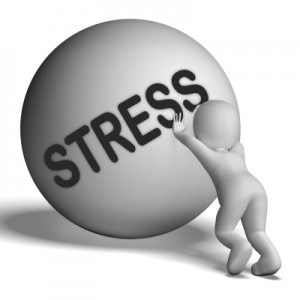
Stress is normal as our life is full of challenges, deadlines, frustrations, and pressures. While stress can be productive, in that it can help us produce better work and meet our goals, too much stress is known to result in severe emotional and physical changes. We’ve heard for years that too much stress can cause damage to the heart and immune system, but what about areas of the brain?
Adriana Galván, a neuroscientist at the University of California, Los Angeles, is studying the effects of stress on brain function in adolescents. She notes that, “studies on stress and cognition across development have mostly focused on chronic, severe and often traumatic stress, such as child abuse or neglect,” but her new research “shows the relationship between normative daily stress and associated stress hormones, and power of decision-making during adolescence.”
When humans are exposed to stress, the brain reacts by secreting a variety of hormones. Of these hormones, adrenaline and cortisol are two that arrive on the scene, increasing the heart rate and blood pressure. Once the stressful situation has ceased, the brain stops the production of these hormones and eventually, the body returns to its natural state.
Chronic stress, which is the response to emotional pressure endured for a prolonged period which an individual recognizes they have no control over, directly affects the hippocampus and prefrontal cortex, the parts of the brain responsible for attention and memory. Chronic stress is common in young people because for many, they are in the initial phase of life learning the skills needed to deal with life’s demands. Galván’s new research showed that chronic stress also affects the adolescents’ amygdala, the part of their brain associated with aggression and anxiety.
Over prolonged periods of time, these changes in adolescents’ brain can influence their ability to make decisions. Of course, the way a young person responds to stress is based on their previous experiences, making it all the more imperative to teach young people about social emotional intelligence.
Teaching our kids how to effectively use social emotional intelligence as a tool will help them understand and manage emotional distress, learn better ways to deal with social situations, build and maintain meaningful relationships, and make responsible decisions.. There comes a point when young people begin to actively judge and address life’s dangers on their own. They are suddenly confronted with situations where they need to decide how to intervene – whether to use violence or counter violence – confrontations that require intense physical and emotional reactions.
Our young people are learning about human intent and motivation, how to deal with struggles and deal with accountability, irresponsibility and malevolence. Without the proper skills, a lot can go wrong along the way. However, with the right skills, with the learned skills of social emotional intelligence, they can come out on top, be successful academically and socially, happier and less stressed.
Author: Divya Parekh (ACC, CPC, LL, MS) is an international career leadership coach, Head Career Coach at International Coach Academy, and CEO of The DP Group. She assists executives, professionals, coaches and students plan, develop and achieve their career and leadership goals. She has been recognized by Worldwide Who’s Who as ‘VIP of the Year’ for showing dedication, leadership and excellence in leadership coaching. She is founder of the 1/1/1 Leader Project. The project prides itself on being simple. Set a goal. Work towards achieving it. Give someone a smile. Be nice to another person. Make the world a little bit nicer. It’s free so get started today!
Article References:
- The American Psychological Association: https://www.apa.org/helpcenter/understanding-chronic-stress.aspx
- Live Science: http://www.livescience.com/11176-stressed-teens-adults-respond-differently.html
- The National Child Traumatic Stress Network: http://www.nctsn.org/resources/audiences/parents-caregivers/understanding-child-traumatic-stress
- 9 Positive Thinking Tips: The power of positivity on your health
Photo Source: courtesy of Stuart Miles / Free Digital Photos
